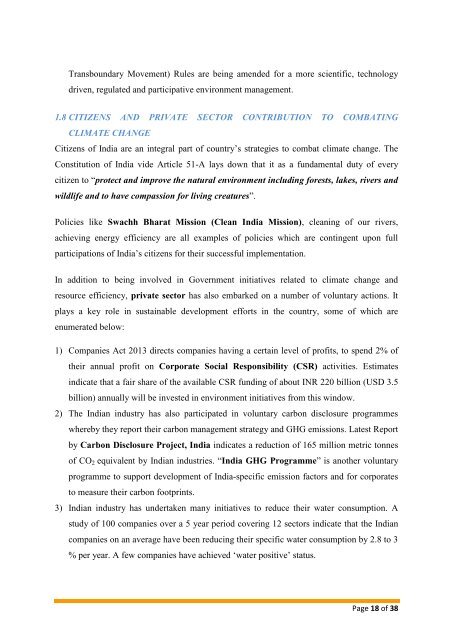INDIA’S INTENDED NATIONALLY DETERMINED CONTRIBUTION
1WsYDcS
1WsYDcS
Create successful ePaper yourself
Turn your PDF publications into a flip-book with our unique Google optimized e-Paper software.
Transboundary Movement) Rules are being amended for a more scientific, technology<br />
driven, regulated and participative environment management.<br />
1.8 CITIZENS AND PRIVATE SECTOR <strong>CONTRIBUTION</strong> TO COMBATING<br />
CLIMATE CHANGE<br />
Citizens of India are an integral part of country’s strategies to combat climate change. The<br />
Constitution of India vide Article 51-A lays down that it as a fundamental duty of every<br />
citizen to “protect and improve the natural environment including forests, lakes, rivers and<br />
wildlife and to have compassion for living creatures”.<br />
Policies like Swachh Bharat Mission (Clean India Mission), cleaning of our rivers,<br />
achieving energy efficiency are all examples of policies which are contingent upon full<br />
participations of India’s citizens for their successful implementation.<br />
In addition to being involved in Government initiatives related to climate change and<br />
resource efficiency, private sector has also embarked on a number of voluntary actions. It<br />
plays a key role in sustainable development efforts in the country, some of which are<br />
enumerated below:<br />
1) Companies Act 2013 directs companies having a certain level of profits, to spend 2% of<br />
their annual profit on Corporate Social Responsibility (CSR) activities. Estimates<br />
indicate that a fair share of the available CSR funding of about INR 220 billion (USD 3.5<br />
billion) annually will be invested in environment initiatives from this window.<br />
2) The Indian industry has also participated in voluntary carbon disclosure programmes<br />
whereby they report their carbon management strategy and GHG emissions. Latest Report<br />
by Carbon Disclosure Project, India indicates a reduction of 165 million metric tonnes<br />
of CO 2 equivalent by Indian industries. “India GHG Programme” is another voluntary<br />
programme to support development of India-specific emission factors and for corporates<br />
to measure their carbon footprints.<br />
3) Indian industry has undertaken many initiatives to reduce their water consumption. A<br />
study of 100 companies over a 5 year period covering 12 sectors indicate that the Indian<br />
companies on an average have been reducing their specific water consumption by 2.8 to 3<br />
% per year. A few companies have achieved ‘water positive’ status.<br />
Page 18 of 38



